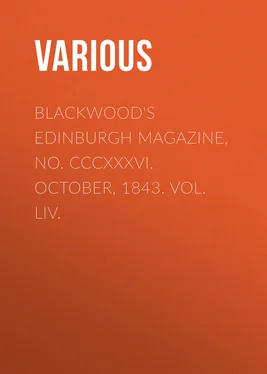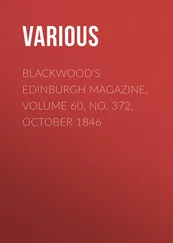Various - Blackwood's Edinburgh Magazine, No. CCCXXXVI. October, 1843. Vol. LIV.
Здесь есть возможность читать онлайн «Various - Blackwood's Edinburgh Magazine, No. CCCXXXVI. October, 1843. Vol. LIV.» — ознакомительный отрывок электронной книги совершенно бесплатно, а после прочтения отрывка купить полную версию. В некоторых случаях можно слушать аудио, скачать через торрент в формате fb2 и присутствует краткое содержание. Издательство: Иностранный паблик, Жанр: foreign_antique, periodic, foreign_edu, на английском языке. Описание произведения, (предисловие) а так же отзывы посетителей доступны на портале библиотеки ЛибКат.
- Название:Blackwood's Edinburgh Magazine, No. CCCXXXVI. October, 1843. Vol. LIV.
- Автор:
- Издательство:Иностранный паблик
- Жанр:
- Год:неизвестен
- ISBN:нет данных
- Рейтинг книги:5 / 5. Голосов: 1
-
Избранное:Добавить в избранное
- Отзывы:
-
Ваша оценка:
- 100
- 1
- 2
- 3
- 4
- 5
Blackwood's Edinburgh Magazine, No. CCCXXXVI. October, 1843. Vol. LIV.: краткое содержание, описание и аннотация
Предлагаем к чтению аннотацию, описание, краткое содержание или предисловие (зависит от того, что написал сам автор книги «Blackwood's Edinburgh Magazine, No. CCCXXXVI. October, 1843. Vol. LIV.»). Если вы не нашли необходимую информацию о книге — напишите в комментариях, мы постараемся отыскать её.
Blackwood's Edinburgh Magazine, No. CCCXXXVI. October, 1843. Vol. LIV. — читать онлайн ознакомительный отрывок
Ниже представлен текст книги, разбитый по страницам. Система сохранения места последней прочитанной страницы, позволяет с удобством читать онлайн бесплатно книгу «Blackwood's Edinburgh Magazine, No. CCCXXXVI. October, 1843. Vol. LIV.», без необходимости каждый раз заново искать на чём Вы остановились. Поставьте закладку, и сможете в любой момент перейти на страницу, на которой закончили чтение.
Интервал:
Закладка:
Many are the topics which are made to reflect a new light as Mr Mill passes along his lengthened course; we might quote as instances, his chapters on Analogy and the Calculation of Chances : and many are the grave and severe discussions that would await us were we to proceed to the close of his volumes, especially to that portion of his work where he applies the canons of science to investigations which relate to human nature and the characters of men. But enough for the present. We repeat, in concluding, the same sentiment that we expressed at the commencement, that such a work as this goes far to redeem the literature of our age from the charge of frivolity and superficiality. Those who have been trained in a different school of thinking, those who have adopted the metaphysics of the transcendental philosophy, will find much in these volumes to dissent from; but no man, be his pretensions or his tenets what they may, who has been accustomed to the study of philosophy, can fail to recognize and admire in this author that acute, patient, enlarged, and persevering thought, which gives to him who possesses it the claim and right to the title of philosopher. There are few men who—applying it to his own species of excellence—might more safely repeat the Io sono anche! of the celebrated Florentine.
MY COUNTRY NEIGHBOURS
People are fond of talking of the hereditary feuds of Italy—the factions of the Capulets and Montagues, the Orsini and Colonne—and, more especially, of the memorable Vendette of Corsica—as if hatred and revenge were solely endemic in the regions of
"The Pyrenean and the river Po!"
Mere prejudice! There is as good hating going on in England as elsewhere. Independent of the personal antipathies generated by politics, the envy, hatred, and malice arising out of every election contest, not a country neighbourhood but has its raging factions; and Browns and Smiths often cherish and maintain an antagonism every whit as bitter as that of the sanguinary progenitors of Romeo and Juliet.
I, for instance, who am but a country gentleman in a small way—an obscure bachelor, abiding from year's end to year's end on my insignificant farm—have witnessed things in my time, which, had they been said and done nearer the tropics, would have been cited far and near in evidence of the turbulence of human passions, and that "the heart is deceitful above all things, and desperately wicked." Seeing that they chanced in a homely parish in Cheshire, no one has been at the trouble to note their strangeness; though, to own the truth, none but the actors in the drama (besides myself, a solitary spectator) are cognizant of its incidents and catastrophe. I might boast, indeed, that I alone am thoroughly in the secret; for it is the spectator only who competently judges the effects of a scene; and merely changing the names, for reasons easily conceivable, I ask leave to relate in the simplest manner a few facts in evidence of my assertion, that England has its Capuletti e Montecchi as well as Verona.
In the first place, let me premise that I am neither of a condition of life, nor condition of mind, to mingle as a friend with those of whose affairs I am about to treat so familiarly, being far too crotchety a fellow not to prefer a saunter with my fishing-tackle on my back, or an evening tête-à-tête with my library of quaint old books, to all the good men's feasts ever eaten at the cost of a formal country visit. Nevertheless, I am not so cold of heart as to be utterly devoid of interest in the destinies of those whose turrets I see peering over the woods that encircle my corn-fields; and as the good old housekeeper, who for these thirty years past has presided over my household, happens to have grandchildren high in service in what are called the two great families in the neighbourhood, scarcely an event or incident passes within their walls that does not find an echo in mine. So much in attestation of my authority. But for such an introduction behind the scenes, much of the stage business of this curious drama would have escaped my notice, or remained incomprehensible.
I am wrong to say the two great "families;" I should have said the two great "houses." At the close of the last century, indeed, our parish of Lexley contained but one; one which had stood there since the days of the first James, nay, even earlier—a fine old manorial hall of grand dimensions and stately architecture, of the species of mixed Gothic so false in taste, but so ornamental in effect, which is considered as betraying the first symptoms of Italian innovation.
The gardens extending in the rear of the house were still more decidedly in the Italian taste, having clipped evergreens and avenues of pyramidal yews, which, combined with the intervening statues, imparted to them something of the air of a cemetery. There were fountains, too, which, in the memory of man, had been never known to play, the marble basins being, if possible, still greener than the grim visages of the fauns and dryads standing forlorn on their dilapidated pedestals amid the neglected alleys.
The first thing I can remember of Lexley Hall, was peeping as a child through the stately iron gratings of the garden, that skirted a by-road leading from my grandfather's farm. The desolateness of the place overawed my young heart. In summer time the parterres were overgrown into a wilderness. The plants threw up their straggling arms so high, that the sunshine could hardly find its way to the quaint old dial that stood there telling its tale of time, though no man regarded; and the cordial fragrance of the strawberry-beds, mingling with entangled masses of honeysuckle in their exuberance of midsummer blossom, seemed to mock me, as I loitered in the dusk near the old gateway, with the tantalizing illusions of a fairy-tale—the Barmecide's feast, or Prince Desire surveying his princess through the impermeable walls of her crystal palace.
But if the enjoyment of the melancholy old gardens of Lexley Hall were withheld from me , no one else seemed to find pleasure or profit therein. Sir Laurence Altham, the lord of the manor and manor-house, was seldom resident in the country. Though a man of mature years, (I speak of the close of the last century,) he was still a man of pleasure—the ruined hulk of the gallant vessel which, early in the reign of George III., had launched itself with unequalled brilliancy on the sparkling current of London life.
At that time, I have heard my grandfather say there was not a mortgage on the Lexley estate! The timber was notoriously the finest in the county. A whole navy was comprised in one of its coppices; and the arching avenues were imposing as the aisles of our Gothic minsters. Alas! it needed the lapse of only half a dozen years to lay bare to the eye of every casual traveller the ancient mansion, so long
"Bosom'd high in tufted trees,"
and only guessed at till you approached the confines of the court-yard.
It was hazard that effected this. The dice-box swept those noble avenues from the face of the estate. Soon after Sir Laurence's coming of age, almost before the church-bells had ceased to announce the joyous event of the attainment of his majority, he was off to the Continent—Paris—Italy—I know not where, and was thenceforward only occasionally heard of in Cheshire as the ornament of the Sardinian or Austrian courts. But these tidings were usually accompanied by a shaking of the head from the old family steward. The timber was to be thinned anew—the tenants to be again amerced. Sir Laurence evidently looked upon the Lexley property as a mere hotbed for his vices. At last the old steward turned surly to our enquiries, and would answer no further questions concerning his master. My grandfather's small farm was the only plot of ground in the parish that did not belong to the estate; and from him the faithful old servant was as careful to conceal the family disgraces, as to maintain the honour of Sir Laurence's name in the ears of his grumbling tenants.
Читать дальшеИнтервал:
Закладка:
Похожие книги на «Blackwood's Edinburgh Magazine, No. CCCXXXVI. October, 1843. Vol. LIV.»
Представляем Вашему вниманию похожие книги на «Blackwood's Edinburgh Magazine, No. CCCXXXVI. October, 1843. Vol. LIV.» списком для выбора. Мы отобрали схожую по названию и смыслу литературу в надежде предоставить читателям больше вариантов отыскать новые, интересные, ещё непрочитанные произведения.
Обсуждение, отзывы о книге «Blackwood's Edinburgh Magazine, No. CCCXXXVI. October, 1843. Vol. LIV.» и просто собственные мнения читателей. Оставьте ваши комментарии, напишите, что Вы думаете о произведении, его смысле или главных героях. Укажите что конкретно понравилось, а что нет, и почему Вы так считаете.












